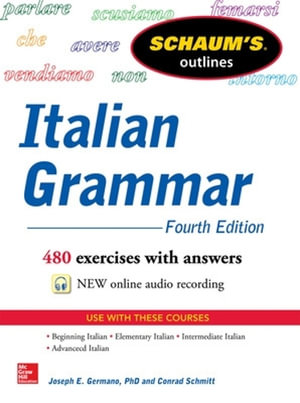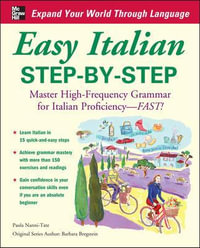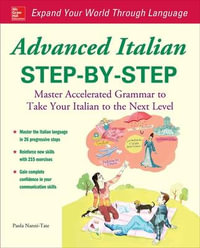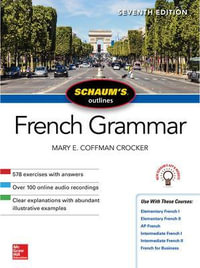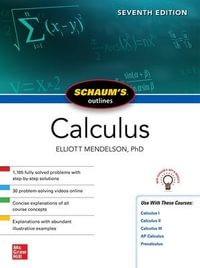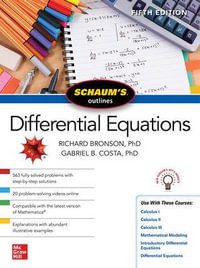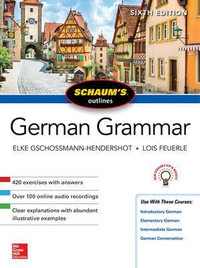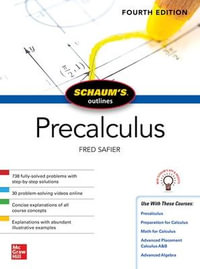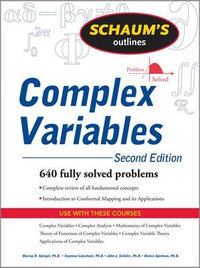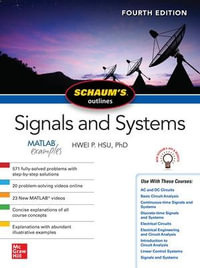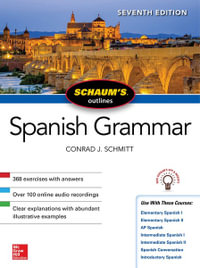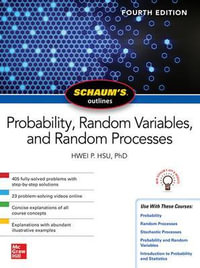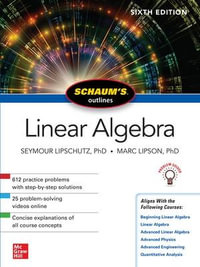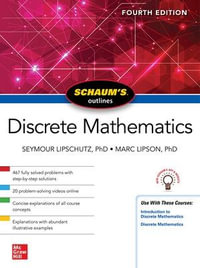Dedication
PREFACE
CONTENTS
Chapter 1 THE PRONUNCIATION OF ITALIAN
The Italian Alphabet and Its Sounds
Sounding out the Alphabet.
Vowels.
Single and double consonants.
Stress (accento tonico) and accent marks.
Diphthongs and triphthongs.
Hiatus.
Syllabication.
Punctuation and Orthographic Marks.
Chapter 2 NOUNS AND ARTICLES
Nouns
Nouns ending in -o and -a.
Plural forms.
Nouns ending in -e.
Nouns referring to human beings.
Nouns referring to things.
Feminine nouns.
Forming the plural.
Masculine nouns ending in -a.
Feminine nouns ending in -o.
Plural of nouns ending in -ca and -ga.
Plural of masculine nouns ending in -co and -go.
Plural of masculine nouns ending in -io.
Nouns with two plurals (feminine and masculine) and two meanings.
Masculine nouns with feminine plurals.
Plural of feminine nouns ending in -cia and -gia.
Plural of nouns ending in a stressed vowel.
Plural of monosyllabic nouns.
Irregular plural nouns.
Masculine and feminine endings of the same noun.
Foreign nouns.
Compound nouns.
Diminutives, augmentatives, and pejoratives.
The Definite Article
With general and abstract nouns.
With titles.
With languages.
With continents, countries, islands, regions, and cities.
With nouns denoting family members preceded by possessive adjectives.
With days of the week.
With prepositions and contractions.
Articulated prepositions.
Feminine singular plural forms.
Masculine plural forms.
Feminine plural forms.
The Indefinite Article
Special uses of the indefinite article.
The Partitive
The partitive versus the definite article.
Exception to the rule for using the partitive.
After expressions of quantity with di.
Chapter 3 ADJECTIVES AND ADVERBS
Adjectives Ending in -o
Adjectives Ending in -e
Adjectives of Nationality
Adjectives Ending in -co, -ca, -go, -ga
Adjectives Ending in -cio, -cia, -gio, -gia
Irregular Adjectives of Color
Adjectives with Shortened Forms
Bello, Grande, Santo, Buono, and Nessuno.
Titles Ending in -e
Formation of Nouns from Adjectives
Possessive Adjectives
With nouns denoting family members or relatives.
Demonstrative Adjectives
Expressions Che! and Quanto!
Formation of Adverbs
Chapter 4 COMPARATIVES AND SUPERLATIVES
Comparatives
Comparative of equality with adjectives.
Comparative of equality with nouns.
Comparative of inequality.
Relative Superlative of Adjectives
Absolute Superlative of Adjectives and Adverbs
Irregular Comparatives and Superlatives
Irregular Comparatives and Superlatives of Adverbs
Chapter 5 NUMBERS, DATES, AND TIME
Numbers
Cardinal numbers.
Special use of Duecento, Trecento, etc.
Ordinal numbers.
Ordinal numbers with titles.
Fractions.
Dates
Days of the week.
Months of the year.
Seasons of the year.
Time
Colloquial time.
Official time.
Chapter 6 VERBS
Moods and Tenses
Simple Tenses
Formal versus familiar forms.
Subject pronouns.
Present Indicative Tense (Presente Indicativo)
Regular first-conjugation verbs.
Verbs in -ciare, -glare, -chiare, -ghiare.
Verbs in -care and -gare.
Regular second-conjugation verbs.
Verbs ending in -cere.
Regular third-conjugation verbs.
Third-conjugation vote with -isc.
Irregular verbs.
Irregular verbs with -co.
Verbs with -go.
Verbs with -io.
Other verbs with a vowel change in the root.
Modal Verbs (Verbi Modali): Dovere, Potere, Volere
Avere and Essere
Special use of the Present Indicative and the Preposition da
Imperfect Indicative Tense (Imperfetto Indicativo)
Regular -are verbs.
Regular -ere verbs.
Regular -ire verbs.
Irregular verbs.
Trarre.
Essere.
Uses of the imperfect indicative tense.
Special use of the imperfect indicative with preposition da.
Preterite Tense (Passato Remoto)
Regular -are verbs.
Regular -ere verbs.
Regular -ire verbs.
Irregular verbs in the preterite.
Avere and Essere.
Uses of the preterite.
Differences between preterite and imperfect indicative.
Two actions in one sentence.
Future Tense (Futuro)
Regular -are verbs.
Regular -ere verbs.
Regular -ire verbs.
Irregular verbs.
Special uses of the future.
Conditional Tense (Condizionale)
First-conjugation (-are) verbs.
Second- and third-conjugation (-ere and -ire) verbs.
Present Perfect or Conversational Past Tense (Passato Prossimo)
Irregular past participles.
Passato prossimo of verbs conjugated with essere.
Past participles conjugated with essere.
Passato prossimo of modal verbs.
Passato prossimo of reflexive verbs.
Uses of the passato prossimo.
Differences between the passato prossimo and the imperfect indicative.
Uses of the present perfect (passato prossimo) and preterite (passato remoto).
Pluperfect Indicative Tense (Trapassato Prossimo)
Verbs using avere.
Verbs using essere.
Preterite Perfect Tense (Trapassato Remoto)
Future Perfect Tense (Futuro Anteriore)
Conditional Perfect Tense (Condizionale Passato)
Subjunctive (Congiuntivo)
Formation of the present subjunctive.
Regular verbs.
Irregular verbs.
Uses of the present subjunctive.
Present subjunctive in relative clauses.
Replacing the present subjunctive with an infinitive construction.
Present Perfect Subjunctive (Congiuntivo Passato)
Imperfect Subjunctive (Congiuntivo Imperfetto)
Formation of the imperfect subjunctive.
Uses of the imperfect subjunctive.
Pluperfect Subjunctive (Congiuntivo Trapassato)
Se clauses.
Imperative (Imperativo)
Formal commands.
Familiar commands.
First-person commands.
Gerund (Gerundio)
Past gerund.
Progressive Tenses (Forma Durativa)
Present progressive.
Imperfect progressive.
Future of probability.
Imperfect subjunctive.
Reflexive Verbs (Verbi Riflessivi)
Compound tenses.
Reciprocal reflexive.
Reflexive versus non-reflexive.
Uses of the Infinitive (Infinito)
The infinitive after prepositions.
The infinitive as a noun.
The infinitive as an indirect command.
The infinitive after lasciare, vedere, and sentire.
Fare in causative constructions.
Passive Voice (Voce Passiva)
Passive voice with si.
Chapter 7 NEGATIVE WORDS AND CONSTRUCTIONS
Making a Sentence Negative
Common Negative Expressions
Negation of Compound Tenses
Negative Infinitive Construction
Chapter 8 INTERROGATIVE WORDS AND CONSTRUCTIONS
Forming Questions in Italian
Interrogative Adverbs and Adverbial Expressions
Interrogative Pronouns che, chi
Interrogative Pronouns qu?le, qu?li
Interrogative Adjectives quale (-i), qu?nto (-a, -i, -e)
Chapter 9 PRONOUNS (PRONOMI)
Subject Pronouns
Singular forms.
Plural forms.
Use of omission of subject pronouns.
Direct Object Pronouns: lo (l'), la (l'), li, le
Formal You: La, Li, Le
Special use of the pronoun lo.
Direct and Indirect Object Pronouns: mi, ti, ci, vi
Personal direct object pronouns in emphatic position.
Indirect Object Pronouns: gli, le, loro
Formal Indirect Object Pronouns: Le, Loro
Ci as an adverb of place. Special meanings with ci.
The Pronoun ne
Double object pronouns.
Position of object pronouns.
Special verbs with indirect objects.
Reflexive Pronouns
Disjunctive pronouns
Disjunctive pronouns after comparatives.
Indefinite Adjectives and Pronouns
Indefinite adjectives and pronouns in the singular.
Indefinite adjectives in the plural.
Possessive Pronouns
Demonstrative Pronouns
Qu?sto and qu?llo.
Relative Pronouns
Che. C?i. Il qu?le, la qu?le, i qu?li, le qu?li. Chi (col?i che, col?i che, coloro che).
Qu?llo che, qu?l che, ciò che. Special use of c?i.
Ecco with Pronouns
Chapter 10 PREPOSITIONS (PREPOSIZIO.NI)
A, in, da, di.
Definite articles with prepositions: contractions.
A and di before an infinitive.
Verbs followed directly by an infinitive.
Chapter 11 SPECIAL USES OF CERTAIN VERBS
Expressions with avere
Special Uses of dovere, potere, sapere, and volere
Dovere.
Potere.
Sapere.
Volere.
Expressions with fare
Giocare, suonare.
Pensare a, pensare di.
Servire, servirsi da, servirsi di.
Tornare, restitu?re, riportare.
VERB CHARTS
ANSWERS
GLOSSARIES:
Italian-English
English-Italian
INDEX
COMPANION AUDIO RECORDING
